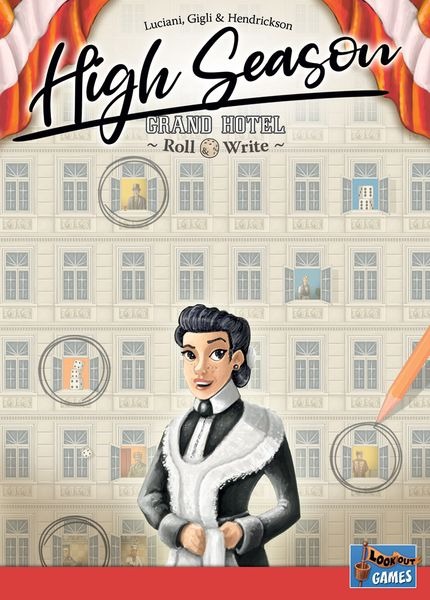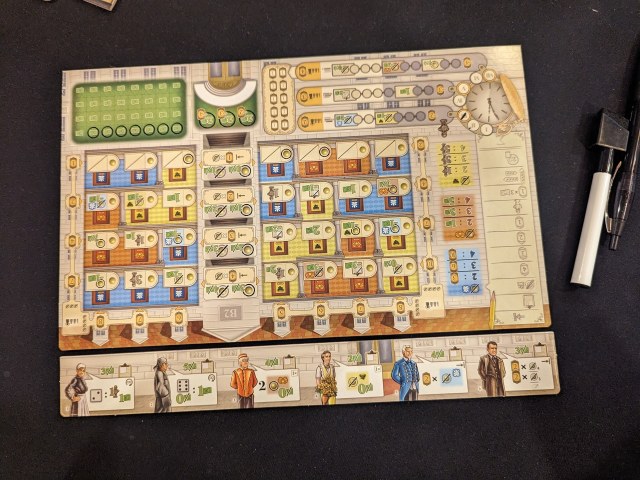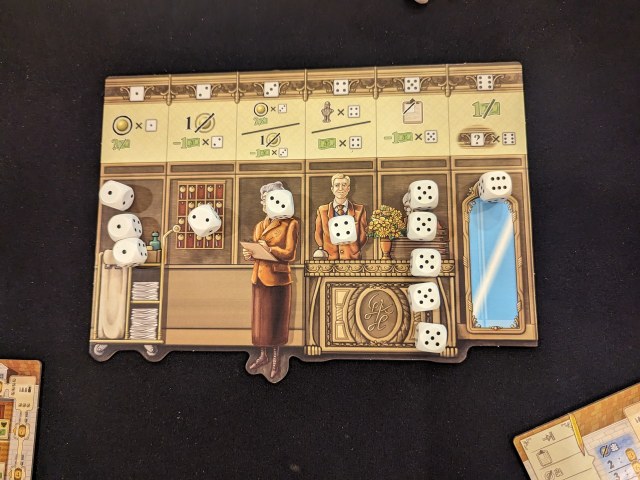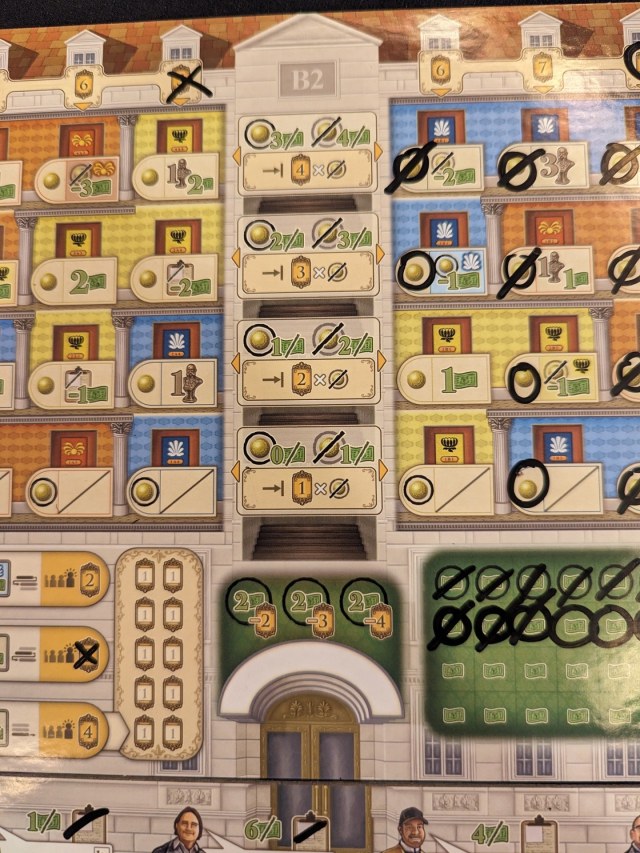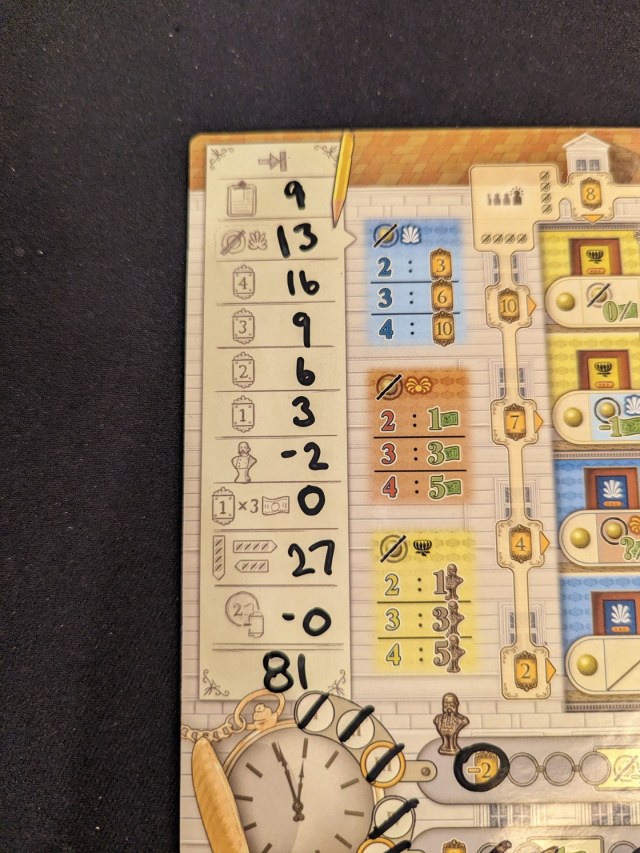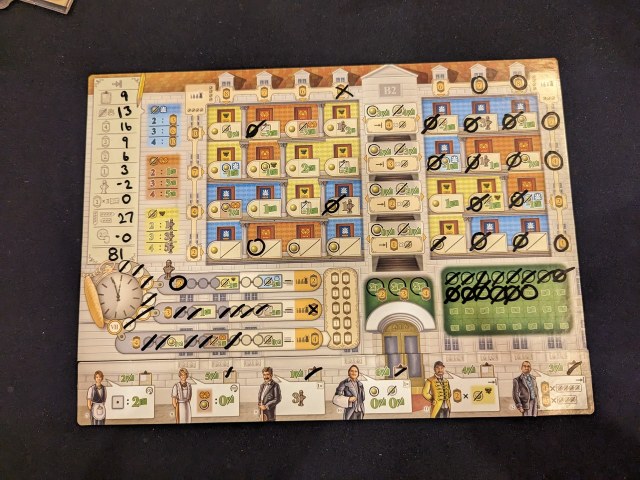High Season: Grand Hotel Roll and Write
- Designers: Virginio Gigli, Ryan Hendrickson, Simone Luciani
- Publisher: Lookout Games
- Players: 2-4
- Age: 12+
- Time: 45 minutes
- Played with copy provided by Lookout Games
Welcome to the best hotel in Vienna! In High Season: Grand Hotel Roll & Write, you prepare rooms, accommodate guests, make personnel decisions, and court the favor of the emperor, all while managing your money and trying to avoid loans.
The game lasts seven rounds, and each player has a random hotel board and random staff board (both are double-sided), with eight of each being available. At the start of a round, roll dice based on the number of players, then place them on the six spaces (numbered 1-6) on the action board. On a turn, draft one of the dice, then use the action associated with it, according to its strength, which is based on the number of dice on that space when you remove it.
The actions allow you to:
- Prepare as many rooms for guests as the strength of the action, paying the cost for each. You circle the doorknob of those rooms, though they must be orthogonally adjacent to previously prepared rooms.
- Occupy a prepared room by paying the cost minus the action’s strength; gain the depicted one-time bonus shown on the room. Show the room is occupied by putting a slash through the circled knob
- Advance on the emperor track equal to the action’s strength; gain the listed bonuses as you reach them, with a point bonus for reaching the end of the track first.
- Earn krone, the game’s currency, equal to the action’s strength. If you don’t have enough money, you also have the opportunity to take three one-time loans, though each gives a VP penalty at the end of the game.
- Hire a staff member on your board, paying their cost minus the action’s strength. Two staff members give you a permanent bonus, two grant a one-time effect, and two provide bonus points during scoring. The bonuses and effects of the staff differ on each staff board, so you need to figure out how to take advantage of the opportunities available through them in combination with your particular arrangement of hotel rooms and the dice available each round.
- As a consolation, if you can’t take an action, simply discard a die for 1 Krone
The player board shows a grid of rooms with a central staircase. The staircase gives you valuable information including the cost to prepare a room, the cost to occupy a room (!) and the point reward for having an occupied room. There are nine groups of rooms in the three different colors, usually spanning floors. When you occupy all the rooms in a contiguous color group on your board, you gain an immediate bonus of points (for a blue group), krone (red), or steps on the emperor’s track (yellow). Furthermore, if you are the first player to fully occupy one of the eight rows – each side of the stairwell is a separate row – or seven columns, you earn bonus points – lending a bit of a race aspect to the game.
After seven rounds, players tally their points, possibly losing some in the process for ignoring the emperor (who visits at the ends of rounds 3, 5 and 7). When the Emperor visits each time, players check their progress on the appropriate Emperor track and receives either a bonus or malus depending on their progress.
The final score is calculated at the end of the 7th round. There is a chart to use on the left side of the player board to help you tabulate:
- Hired Staff
- Blue room group bonus
- Points per occupied room on each of the 4 floors
- Points from the Emperor’s three check-ins
- Money: 1 VP per 3 Krone leftover
- Row and Column bonuses
- Negative points from loans
The player with the most points wins. There is no tiebreaker
My thoughts on the game
So, Grand Hotel Austria is one of those games that I love the concept of, but it just doesn’t hit the table that often around here. I was excited to see this roll-and-write spinoff as I was hoping it would give some of the flavor of the base game with a little less of the crunchiness. Well, High Season is definitely lighter than the original though it tries to keep the same theme. A bit seems to be lost in translation here though, as it doesn’t make any sense for me to have to spend money in order to get a room occupied… I mean, the whole idea of running a hotel is to have the guests pay you to stay in the room?
Anyways, getting past that theme disconnect, there is a fairly complex roll and write game going on. I love the action selection process of the game, and I find that it gives you lots of interesting decisions. Additionally, you have to remember that you really don’t get that many decisions here – only fourteen total, two each in the seven rounds – so you should make each one count.
Trying to figure out which action is best to take at a given moment feels difficult in your first game or two, but once you know how the game plays out, I don’t know if there is much deeper strategy to discover in your fourth/fifth/… games.
One thing I’ve had to tell newbies is to temper their expectations of a full hotel. As each occupy action only lets you complete a single room (and you have to have the money to pay for it), it is not uncommon for first-timers to only have 5 to 8 rooms occupied out of the 28 in the hotel. Thematically, this seems like a horrible way to run a hotel, but hey, we’re in a boardgame utopian hotel, so that’s how it goes. I think it’s good to remind people of this fact so that they don’t go out and prepare rooms they will never have a chance to fill.
The game also tries to make this a bit easier for you giving you three rolls to be able to open (1, 3, 6) or fill (2, 3, 6) rooms. Of course, all of this takes money, and that is another sticky point. You can earn some money by completing the correct block of rooms, or else, you’ll have to spend one or more of your precious 14 actions taking the earn money action. The three loans are available, but they cost you points, so choose when to do that wisely.
Each game will be a little different depending on the staff board you randomly get, and of course, due to the vagaries of the dice rolling. Unlike many roll-and-write games, there is no ability to re-roll the dice here. For me, this is nice in one way because it gives you one less thing to think about – all you can do is stare at the dice and figure out the best play based on what you see. Trying to figure out what is the best way to leverage your ongoing employee abilities is key to my strategy as I try to get those going from the first turn so that I can take advantage of them for as much of the game as possible.
Like many roll-and-writes, the game has a lot of simultaneous solitaire activity going on – but it does the typical race interaction where bonuses can be scored for being the first to complete a row or column in the hotel. Additionally, the way in which the dice are chosen can have an effect on future actions (either in the strength or availability). I find that I am better off not looking at the board too much when it’s not my turn – as I don’t want to give away what I am hoping to choose.
Does it replace Grand Hotel: Austria? For me, no not really. But it is a great complex RAW that gives you a lot to think about. Your first few games will probably not lead to great scores as you’ll have to figure out the tempo of opening and filling rooms and learning how to chain actions together. With only fourteen turns in the game, getting those extra chained actions is generally the difference between a mediocre score and a good one.
Ratings from the Opinionated Gamers
- I love it!
- I like it. Dale
- Neutral.
- Not for me..

